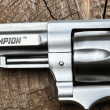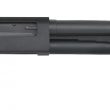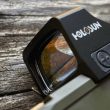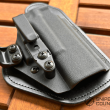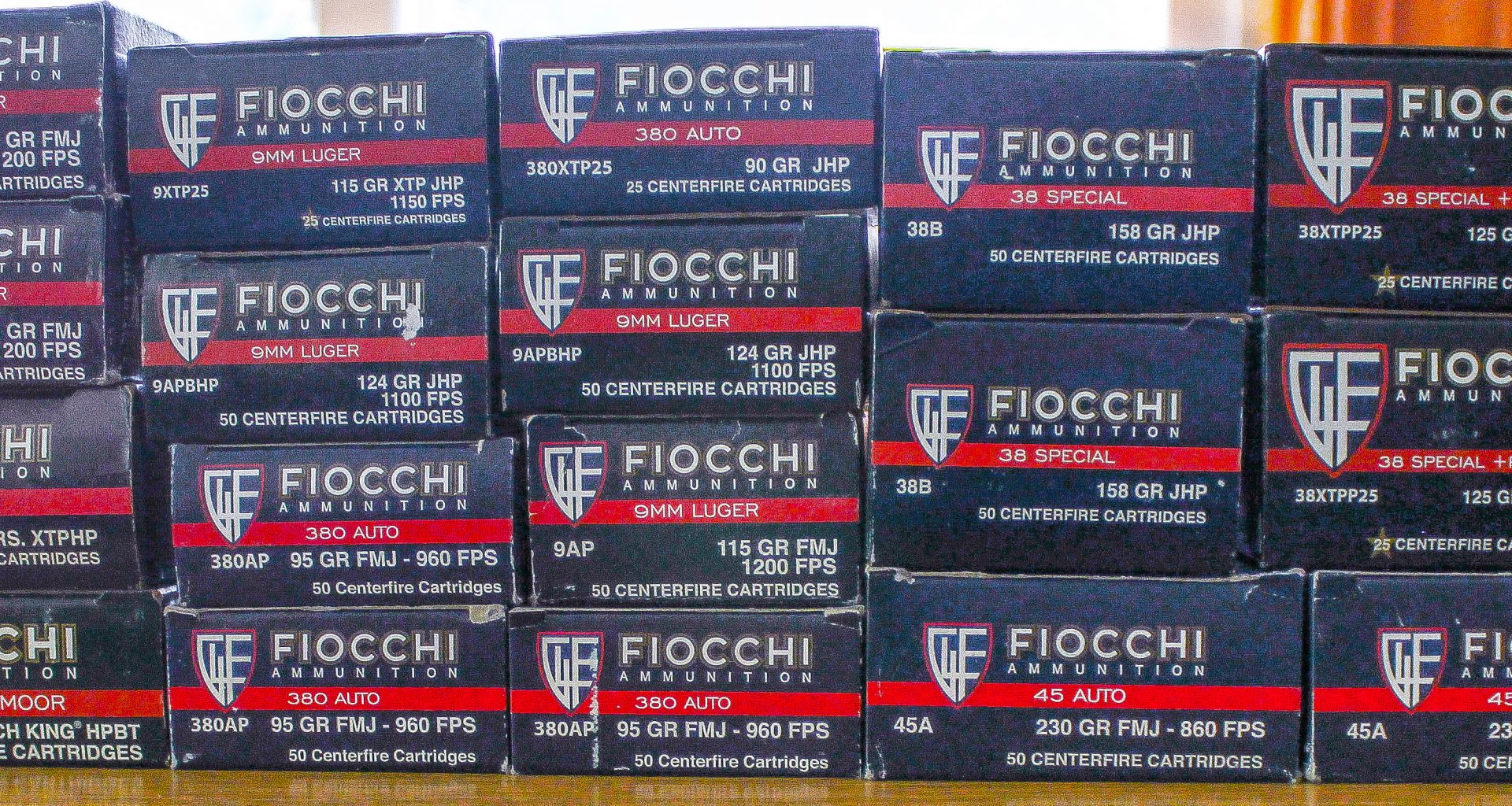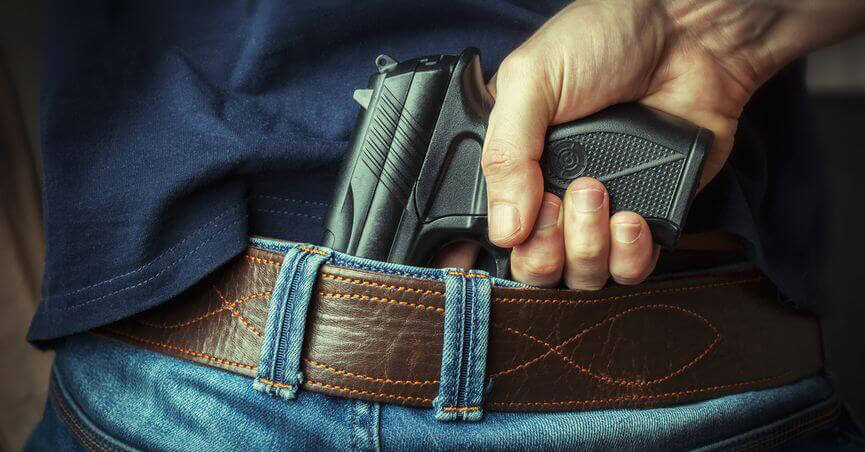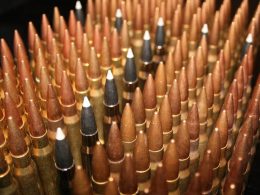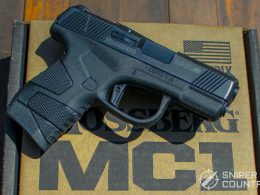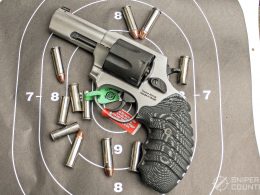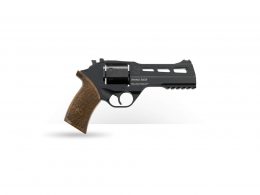Quick — I say “Fiocchi ammo” and you come back with: “_____!”
OK… let me fill in the blank. You might say “They make some great .22 rimfire ammo!”, or “Not bad for being made in Italy!” (Speaking of Italy, I’ve heard different pronunciations of “Fiocchi” – for the record, it’s fee-OH-key).
You would be correct on both counts, except that your responses would ignore a couple of other very pertinent facts…they make more than just .22 rimfire ammo, and everything you see in the photos herein was made in the good ol’ U.S.A. Huh? When did that happen, I hear you ask your device’s screen…
The Company
Fiocchi Munizioni (Ammunition) was formed in Lecco (in northern Italy) in 1876 by an accountant named Giulio Fiocchi, when he took over production of ammo from an existing Lecco company. This was at a time when breechloaders were becoming popular and muzzle-loading guns were slipping from popularity. At first, they made shotshell cases and primers for future production but in 1890 started producing loaded cartridges. That was the year they quit making black powder, as it was falling out of favor. A few other important dates in the company’s history might include:
- 1930: beginning of ammunition exports
- 1945/1946: bombing of the Lecco plant/rebuilding of that plant
- 1980: start of .22 Super Match production
- 1983: Fiocchi of America is founded
- 1989: NATO qualification of their 9mm round
- 1999: NATO qualification of their 5.56mm round
I have skipped many dates, as there were several times when the factory upgraded its equipment and certifications. Suffice it to say that Fiocchi is a major player in worldwide ammo production.
The American Connection
The American side of the business was started in the 1950s with a partnership between Fiocchi and Smith & Wesson. A plant was set up in Alton, Illinois which operated until Fiocchi decided to sell its share of the plant to S&W and withdraw totally from the American market. Like many Italian firearms-related companies, the founding family has always been heavily invested in the running of this company. This connection was brought to the forefront when, in 1980, great-grandson Carlo Fiocchi regenerated interest in providing an American presence for his family’s product when he came to the U.S. on his honeymoon. He told the family that the only way to successfully rejuvenate the company’s business here would be to have an actual facility in the U.S. They set up a Fiocchi of America site in Springfield, Missouri to import ammo. Realizing that the ammunition market changed more quickly than they could adjust to it as importers, he returned to Italy and talked to company president Paulo about opening a manufacturing facility in nearby Missouri. They consequently decided to build on a farm site in Ozark, Missouri. The plant did alright, but in April, 2005 it was reorganized by Pietro, Carlo and Donna Swafford, chief operations manager. That reorganization saw U.S. sales jump about 500%, placing Fiocchi in the big leagues of American ammo production and consumption.
Back to my involvement… When I was informed that I might be able to have some Fiocchi ammo sent to me for testing and a review, I jumped at the chance. I mean, what shooter turns down ammo? I’m really glad I accepted. I’ve used and mentioned Fiocchi ammo in a few earlier reviews (mostly 9mm ammo), with very good results. When I received the additional shipment, I had enough for this stand-alone review. I am impressed – this stuff is really good. To date, I have received ammunition in the following calibers. Some boxes have velocities printed on them, others don’t…
- .380 Auto, 95 grain FMJ, 960 fps
- 380 Auto, 90 grain JHP
- .38 Special, 158 grain JHP
- .38 Special, 125 grain XTP, 1050 fps
- 9mm, 115 grain FMJ, 1200 fps
- 9mm, 115 grain XTP, 1150 fps
- 9mm, 124 grain JHP, 1100 fps
- .45 ACP, 230 grain FMJ, 860 fps
- .45 ACP, 200 grain XTP
and, lastly, the 6.5 Creedmoor. The version of this popular rifle cartridge they sent was the 142 grain Match, no velocity listed.
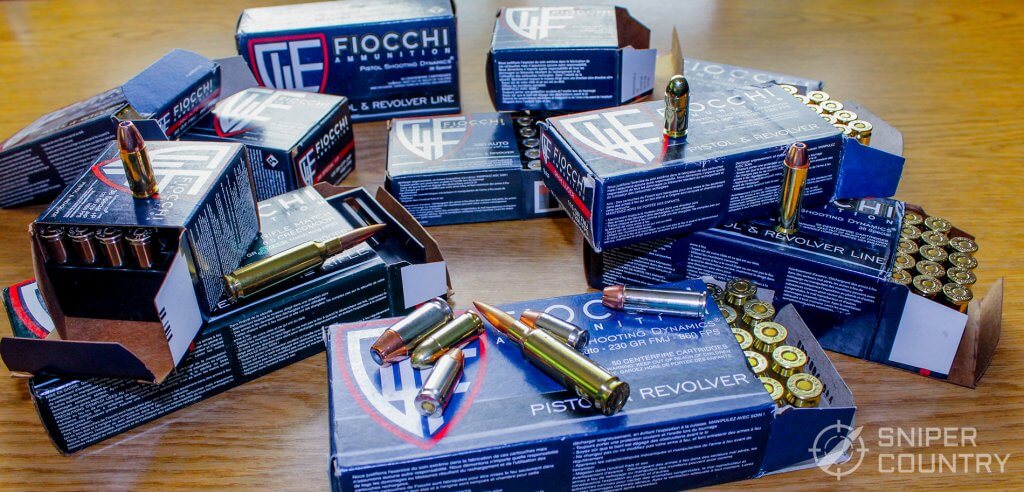
This is but a drop in the ocean of products they make. I tried to get a count of all the different loads and calibers they produce but was thwarted in my attempt by the sheer number of products they produce.
Here is the basic, starting guide they use on their website that helps you focus on loads for a specific purpose:
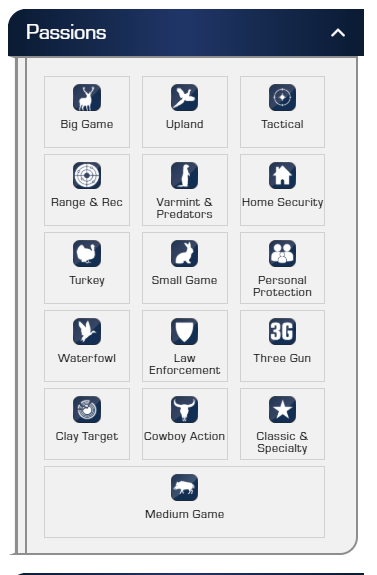
Now, we know that there will be some overlap but…that’s a lot of product! All ammo destined for US consumption is made here, including rimfire and shotshell. From .455 Webley to .44-40 to blanks (they make blanks in several calibers), Fiocchi makes ammo for it. Speaking of blanks, here are three of those calibers…
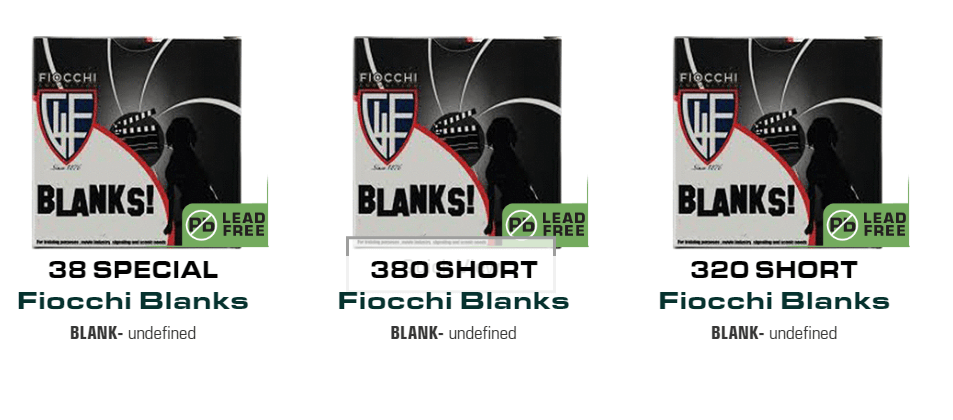
If you want to take a virtual tour of the ammo they produce by viewing their website, better bring your lunch — there are a whole lot of different calibers and types of ammo therein. They do keep busy.
As you look at the diagram above, you see a lot of shotgun-type uses listed. From upland to turkey to waterfowl, etc., they make it. Fiocchi started out by making shotshell components for reloading as mentioned above, and to this day are a huge manufacturer of shotshells.
Here’s something they make that I have a particular interest in, and have requested some to try: primers.
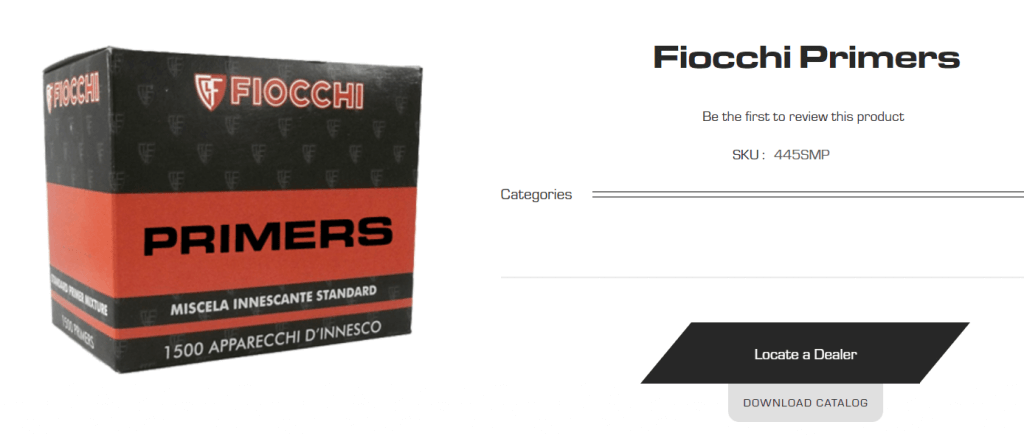
They make six different types, including both heavy metal free and lead styphnate. It’s interesting to see how they are packaged — there are 1500 in the box. Most other primers come in boxes of 1000, ten packs of 100. I am anxious to try these. The primer is a very important component of a reload in terms of consistency and accuracy. If you want to know more about the topic, read my reloading guide.
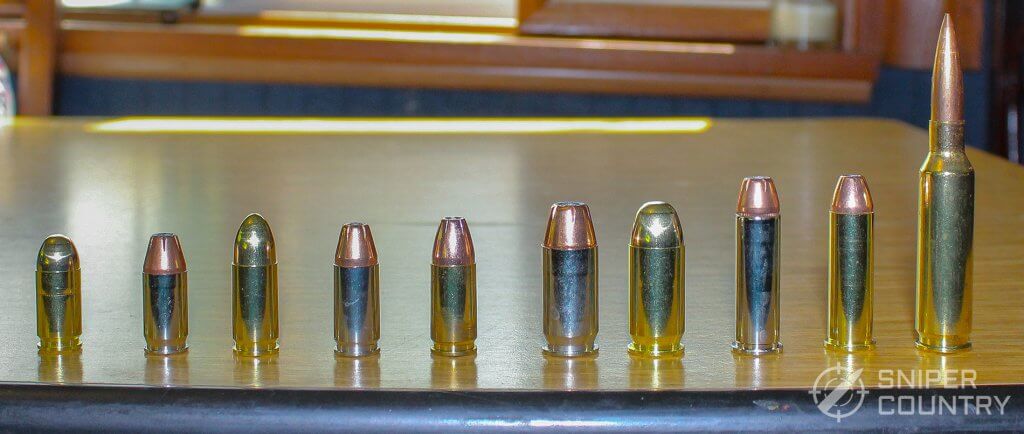
BONUS OFFER: Get your free shooting range targets to print at home!
Get your free targets to print at home!
Some Range Results
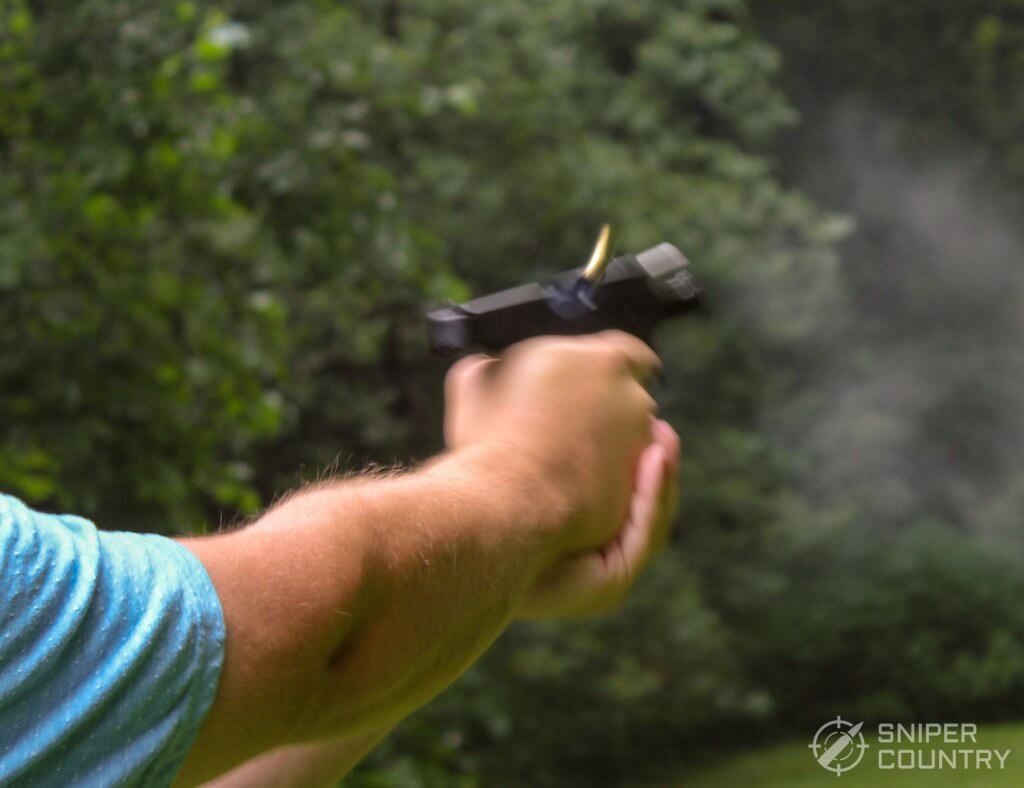
I shot much of the ammo that was sent to me, in both formal target settings and informal plinking. What didn’t get used will appear in future reviews. This ammo is accurate and consistent. Here are a couple of representative targets, from shooting .380 Auto and 9mm… nothing very special here, but these were shot by my oldest son, who doesn’t have many chances to shoot – he does alright, by the look of things. I welcomed him as a shooter so as to get input and targets from an average shooter, one who doesn’t shoot every day (or every week, for that matter). I didn’t chronograph these loads, for the main reason that velocity figures printed on boxes rarely have anything to do with real-world results from carry-sized guns. There are exceptions, of course — some specialty makers are very accurate in their ammo figures on their boxes, because they are spec’d for short barrels and some major ammo makers follow suit. By and large, though, most printed velocities are obtained from longer pressure barrels in ballistic laboratory situations. I’m not saying that I will not chrono factory ammo any more — I’m sure I will do that at some point. It’s just that I’m more interested in the accuracy angle. A bullet pushed at very fast speeds will do no good if it doesn’t hit what it’s aimed at. At any rate, here are a couple of sample targets…
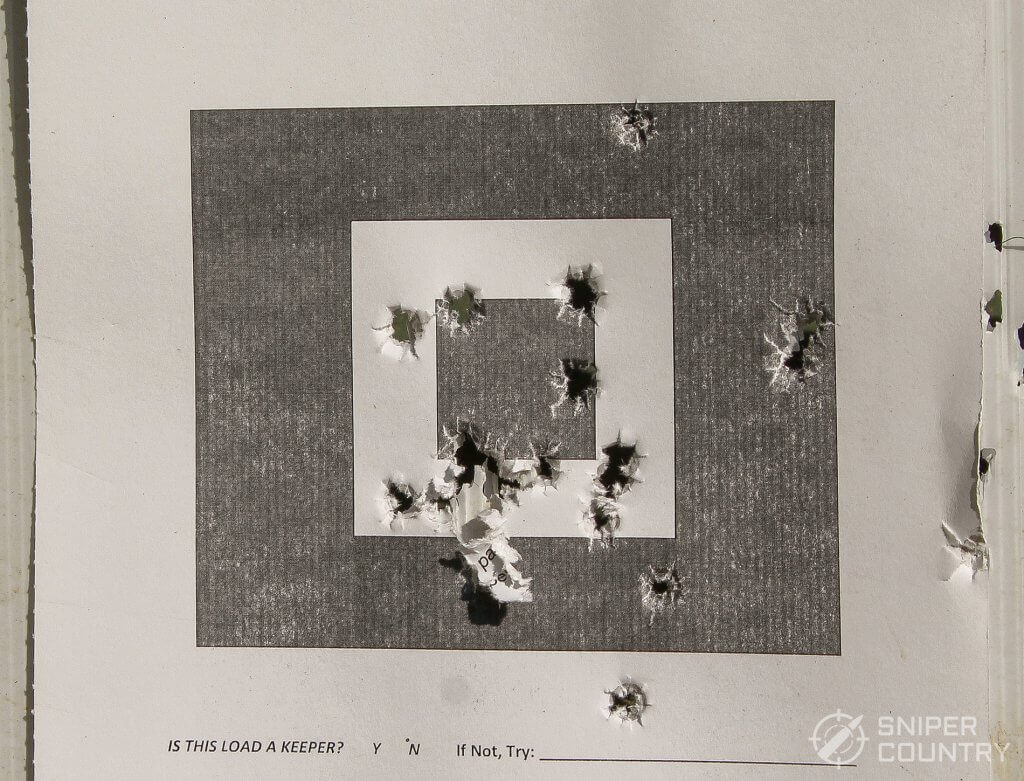
above, .380 Auto from my Taurus Spectrum, standing, 15 yards. Group shot well and to point of aim. This was the 95-grain FMJ load.
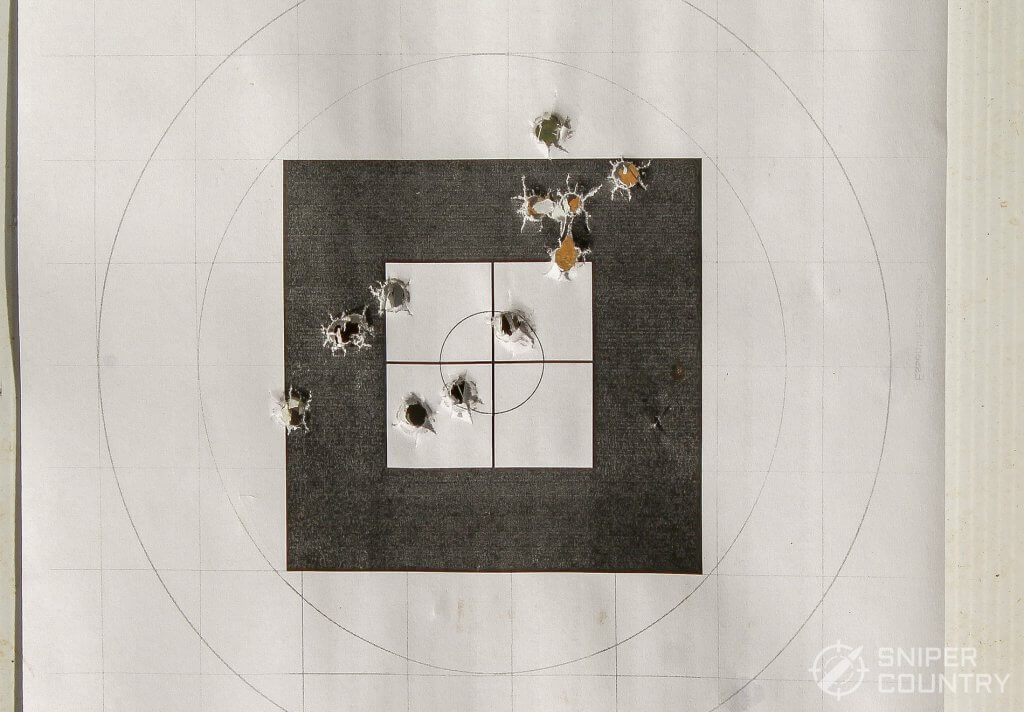
Another of the targets my son shot – the 9mm 115-grain FMJ load shot from a Taurus G3c, standing, 15 yards. Again, not too shabby especially for a guy who hasn’t shot much for a couple of years.
We are in the middle of a heat wave, with 95-degree temps and 60-70% humidity so we did not do exhaustive testing with the loads sent. We did shoot representative groups using the .380, .38 Special and 9mm. Everything we shot was accurate and to point of aim, which is very important when shooting a small, concealed-carry gun. No adjustable sights here, so it’s good that they are not needed. I was very pleased with the results, as was my son. We can expect results from the 6.5 Creedmoor and .45 loads in later reviews, so stay tuned. Hopefully it will be cooler and the scopes not fogged over from the humidity.
Fiocchi Primers — An Update
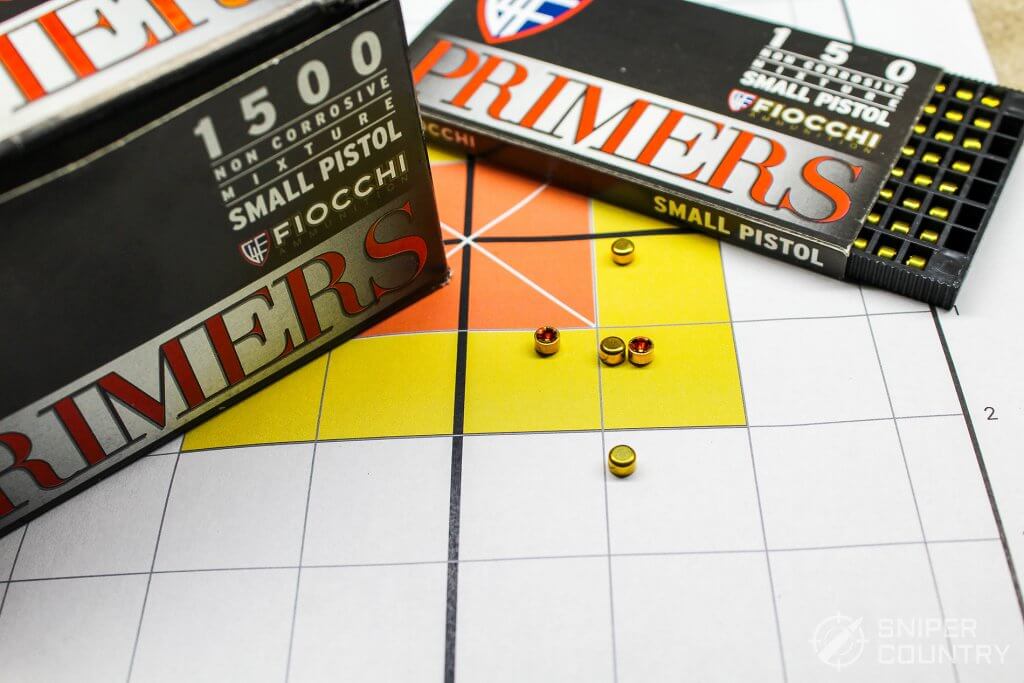
In this review of Fiocchi ammo, I wanted to try some of their primers after I found out that they sold them. So, I requested some Fiocchi primers to try a good while ago, and they arrived the other day. I will update my ammo review at this point now that I have taken delivery of those primers. I had requested small pistol regular primers to use in 9mm, .38 Special and .357 Magnum loads. I finally received a large box of primers, and so I couldn’t wait to give them a try. Here are a couple of photos I took…
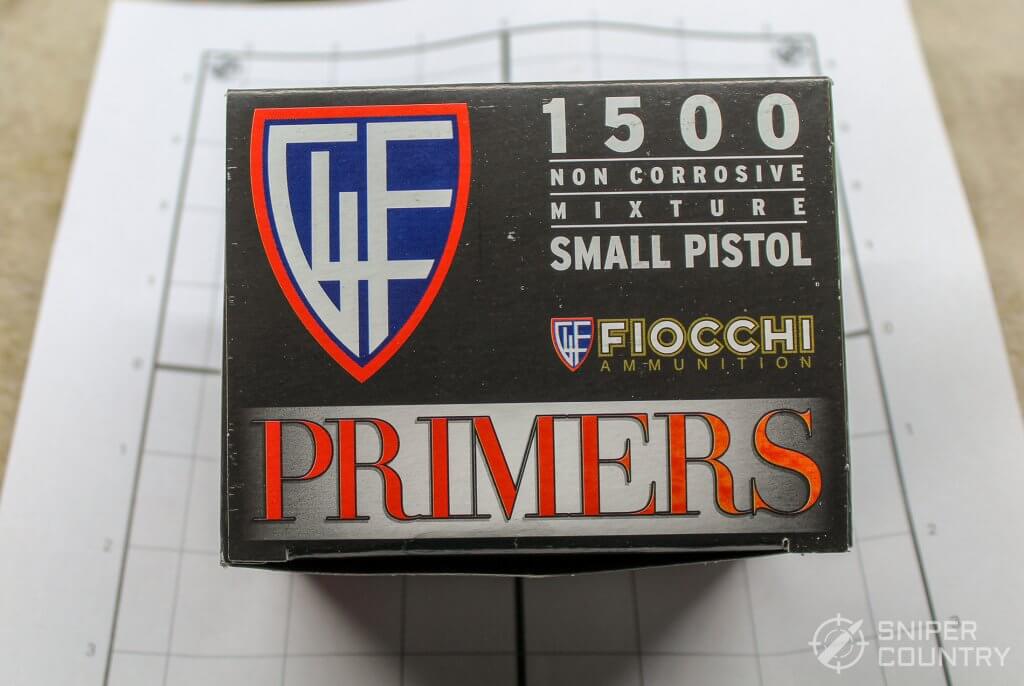
If you are a reloader and you load any caliber of pistol, rifle or shotgun gauge, you know how critical the primer is. A good primer can create an accurate, consistent load, whereas a low-quality one can hurt your reloading efforts. I have never come across, in over 40 years of reloading, what I would call a bad primer, but some of the very inexpensive ones from other countries have yielded some suspect results. Usually, primers made by companies such as CCI, Federal, Winchester and Remington are very good. I have used primers from all those companies over the years with generally excellent results. I have never had the cause to use magnum primers in either large or small pistol (I don’t do enough rifle to make a difference), as I usually create target- to mid-level loads in whatever caliber I’m loading. I use fast or fast-medium burn rate powders, so the increased flame of a magnum primer is not needed.
I am used to buying primers by the 1,000… that is how the primers I mentioned above are packaged. Ten packs of 100, that’s common. I was a bit surprised to see, on Fiocchi’s website, that their primers are sold in 1,500 packages… ten individual smaller packs of 150 primers…. ten individual smaller packs of 1,500 primers. That was interesting, and got my attention. I also knew that Fiocchi makes a ton of ammo in the United States as well as in Italy, so it was no surprise that they would make primers as well. The listing of the calibers and gauges of the ammo that they make is very, very long so they would need a ready source of primers — that would include both metallic centerfire rifle and handgun, and shotgun as well. From common, everyday calibers to classic rounds that are hard to find, Fiocchi builds ammo for it. The common area among all the centerfire ammo they make is that all those calibers need primers, so they make a lot of them.
I loaded my usual go-to 9mm load to test the primers I received. My load consists of my home-cast and powder-coated Lee 124-grain round nose bullet over 4.8 grains of Long Shot powder. That load is technically below the Hodgdon load data for a minimum charge of that powder with that bullet by .2/grain but it has worked very well in most all the 9mm pistols I’ve shot it in. It is usually pretty accurate and hits very close to point of aim. I shot the load through the Ruger Security-9 pistol I was reviewing at the time and came up with these numbers from my home-grown ballistic spreadsheet…
| Number of Shots: | 7 |
| Lowest Velocity: | 963 f.p.s |
| Highest Velocity: | 1018 f.p.s |
| Average Velocity: | 1000 f.p.s |
| Energy (fp): | 275 foot pounds |
| Standard Deviation: | 20 |
| Power Factor: | 124 Minor |
| Extreme Spread: | 55 |
The important number, as far as I’m concerned, is the standard deviation. In my experience, the lower the S.D. is, the more accurate the load has the potential of being. I have found that loads that show a S.D. of around 25 or lower tends to fulfill that prediction — they tend to be more accurate. If you can get the S.D. under 10, then you have a load that is truly capable of really good accuracy. I was pleased with this number (20) in this example, and I have seen that S.D. number even lower when the load was shot from other 9mm guns.
Why go on about this? Because the primer is a part of the equation that produces low S.D. numbers, which in turn can lead to greater accuracy. If your load produces, with regularity, a standard deviation greater than 30 or so, you need to examine the components that you are using. The primer is sometimes the last item to be scrutinized in the quest for fine-tuned accuracy but it should not be ignored. These Fiocchi primers look to be real winners, as far as I’m concerned. I will continue to test them in my .38 Special and other small-pistol-primer loads but I expect that the results will be good.
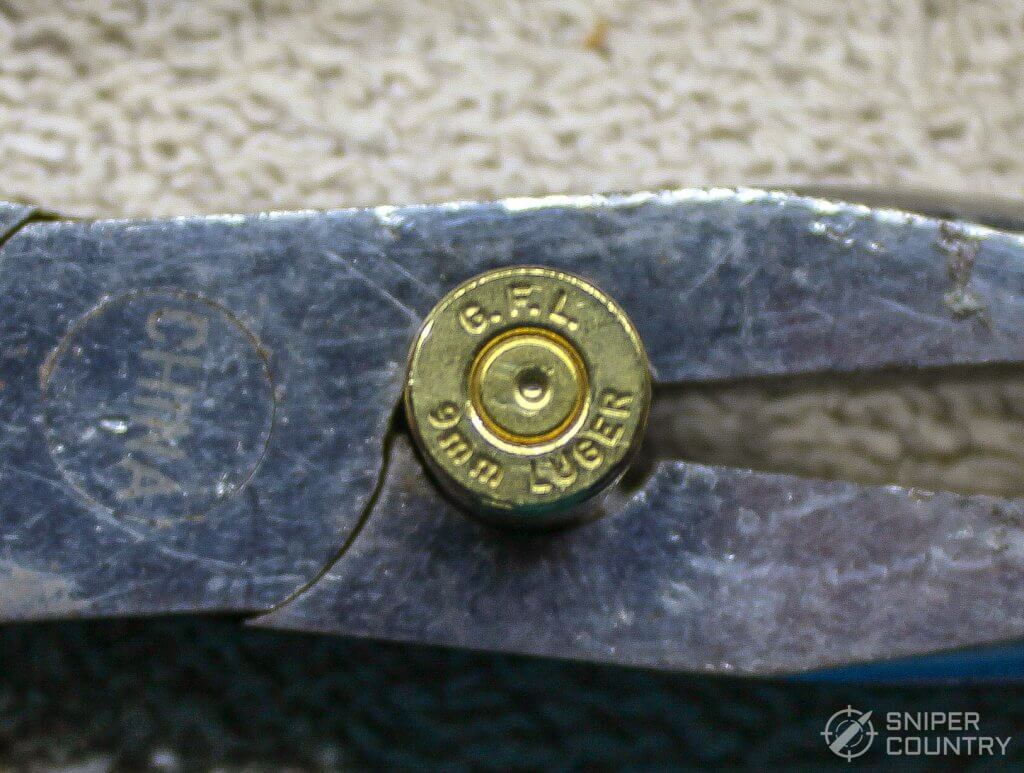
I was also surprised by how the primers were finished. They obviously had been polished, somehow, as the primers’ cups are very shiny. This is a really small thing to mention, but I thought it worth speaking about. Many primers that I’ve used over the years have looked like that they were not finished at all. I guess I figure that a company that makes the effort to polish the cups of the primers they sell probably takes care during the manufacturing process as well. At any rate, I am impressed with these primers.
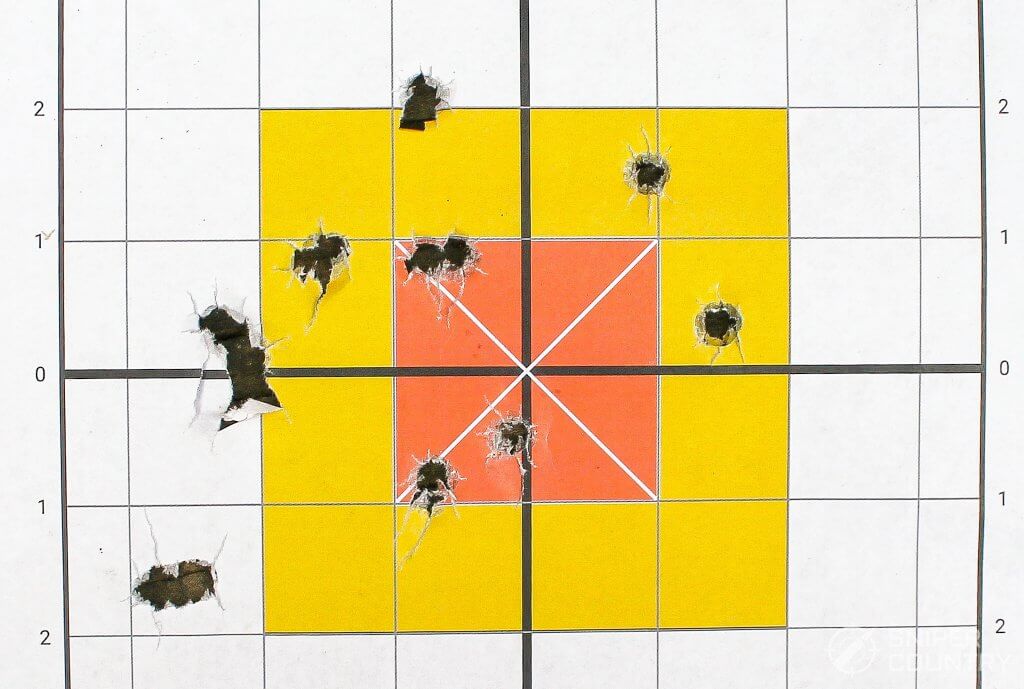
In this day and age of reloading components, ammunition and guns being extremely scarce, a shooter and reloader needs to get the best bang for their buck, so to speak. To my way of thinking, if you can get 1,500 primers for just about the same price that you would spend for 1,000, why would you not do that? That’s a no-brainer.
As always, if you’ve had experience with Fiocchi primers, please leave a comment below. I would be interested to hear what you think.
To Sum Up
There are more ammunition manufacturers world-wide than there ever has been. The shooter has more options to choose from than ever before. Even accounting for the pandemic, ammo is (for the most part) available and affordable. There have been glitches, of course, due to the virus, but we’re still in pretty good shape overall. Some calibers are harder to come by and more expensive than others, but hopefully that will even out.
Remington, Speer, Hornady, Federal. Winchester, etc. etc… the number of ammo makers is very large, especially if you count foreign brands. There are variations upon variations: bullet weight, powder type, powder charge, bullet type and every factor therein. You should be able to find a load for whatever purpose you desire, whether target, hunting, protection, competition or other usage. I do believe that Fiocchi fits into the overall ammo picture very well. One area that they seem to excel in is producing loads for older, antique or “exotic” calibers. I mentioned above the .455 Webley — you normally can’t walk into an ordinary gun shop and pick up a box or two of that. That’s just one example. If you are into rare calibers, Fiocchi can be your friend… the 7.62 Nagant is another example, as are 32 gauge shotshells. These are just a few examples of some of the off-the-beaten-path cartridges they make. They are also very big into shotshells, .22 rimfire and large volume production of other, mainstream calibers. A quick glance at one ammo retailer’s website, Lucky Gunner, showed many different Fiocchi loads – both shotshell and metallic. This is just one example — I tend to look at their site where ammo is concerned, as they tend to have a big selection and they also show ballistic gel tests for a lot of what they sell.
At any rate, Fiocchi is there for you, no matter where or how you buy it (buy it here). I’m glad that I was offered the chance to review some of their excellent cartridges. I do think you could do worse. They tend to make accurate, affordable ammo. If you’ve had experience with this brand, tell us about it below. As always, get out to shoot and stay safe!

